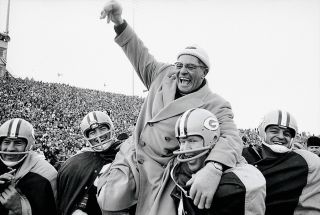Leadership
Vince Lombardi's Secret to Great Leadership
Do you think Lombardi was just a brutal taskmaster? Think again.
Posted November 25, 2023 Reviewed by Hara Estroff Marano
Key points
- Vince Lombardi is one of the most outstanding leaders in the history of sports.
- Lombardi was known as a harsh taskmaster who embraced football's violence.
- Lombardi's secret as a leader originated outside sport, in virtue.
- Lombardi believed his team's success was grounded in love.

Vince Lombardi is often regarded as the greatest coach in the history of professional football, in large part because he engineered the transformation of a losing team, the 1950s Green Bay Packers, into arguably the greatest team ever, winning five championships in only seven years.
Lombardi attributed his success to his coaching philosophy, which consisted of basic principles, such as embracing football's "controlled violence," repeating plays until they became second nature, refusing to yield, ignoring fatigue, and "always getting up again after you were knocked down." Lombardi rode his players hard, but they soon learned what it meant: He cared about and believed in them. By contrast, those he ignored were usually on their way out.
To say that Lombardi loved the game of football would be an understatement. He carried with him a tome made up of plays in Xs and Os, which the players regarded as his Bible. His signature play, which came to be known as the "Packers' sweep," was not entirely his invention, but he practiced it until his players knew it in their sleep.
The back would take a hand-off and then run along the line of scrimmage, turning upfield behind the lead blockers. Lombardi liked to say that to execute the play, 11 men needed to function as one.
Lombardi embodied incredible clarity. As a football coach, his primary mission, as he conceived of it, was to mold character and help his players see clearly what they needed to accomplish. His star quarterback with the Packers, Bart Starr, famously said that Lombardi's approach slowed the game down.
Said Starr, when Lombardi took over the team, it was as though "someone had come in and turned on the lights." He told his players over and over that they needed to pay the price for excellence.
Lombardi's players recognized that his greatness lay less in his knowledge of football strategy and tactics than his mastery of psychology. For example, when he yelled at quarterback Starr in front of the team, Starr felt it undermined his leadership. So, throughout their many years together, Lombardi yelled at Starr only once.
Lombardi said other coaches know more about Xs and Os, but that he had an edge. "I know more than they do about football players."
Lombardi is often associated with the declaration, "Winning isn't everything; it's the only thing." But this is misleading. For one thing, Lombardi would never cheat to win. What mattered most was playing well according to the spirit of the game, not merely winning. Lombardi wanted to win, but he wanted to do so with brains, heart, and by the rules.
Faith was a huge part of Lombardi's life. Before he left home each morning, he fell to his knees and prayed. A friend said he could drive by Lombardi's church at 7:56 a.m. on any day and be assured of waving to the coach as he entered the building.
Lombardi described it as the "greatest day of my life," not winning a football championship but receiving his alma mater Fordham University's Insignis Medal for "Distinction in service to God through excellence in his chosen profession."
And here lies the secret, as Lombardi saw it, to why the Green Bay Packers were the greatest team. "On this team," Lombardi said, "there is great love." Vince Lombardi loved his teams and his players, and in loving them, he did everything in his power to help them become the very best they could be.
Today, many leaders eschew the "L" word. But it is the secret to leadership at its best. Clarity of purpose, deep acquaintance with and affection for colleagues, and unwavering commitment to excellence spring from such love.
References
Marannis, D. When Pride Still Mattered: A Life of Vince Lombardi. New York: Simon and Schuster, 1999.


